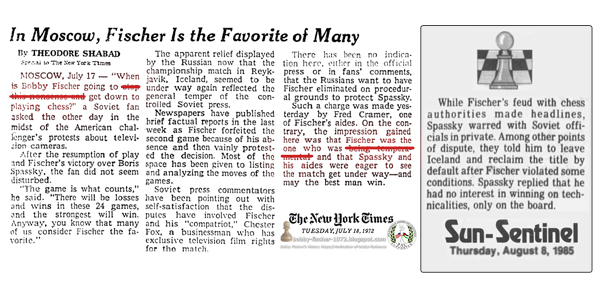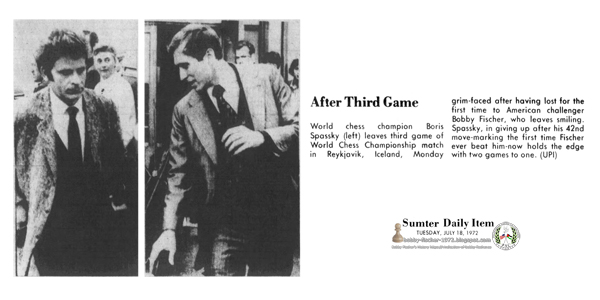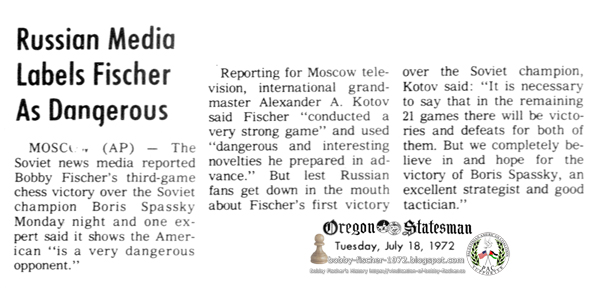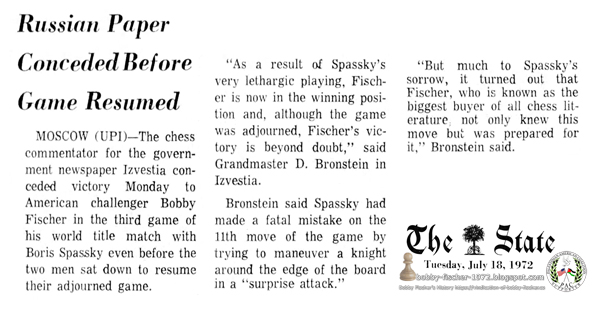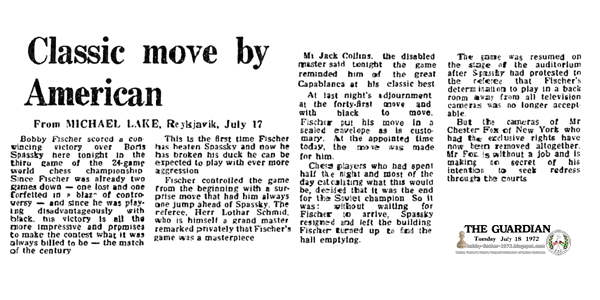New York Times New York, New York, Tuesday, July 18, 1972 - Page 21
Spassky Appears Weak on Opening by Al Horowitz
Reykjavik, Iceland, July 17—The two games played thus far in the world championship chess match have disclosed that Boris Spassky, the champion, seems to be lacking in knowledge of the openings.
In both games, the American challenger, Bobby Fischer, by playing an unusual defense, stole the initiative in the first few moves and was not punished for it. In fact, after about a dozen moves, Fischer was in command in the first game, a Tarrasch Defense.
In the third game (the second was forfeited by Fischer because he boycotted it), the Benoni Defense gave Fischer an immediate plus. During the game one of Spassky's pawns became vulnerable and fell.
After a few moves it became evident that Spassky had no counterpattern of his own. In many cases, without too much effort, Fischer obtained the better game and in fact gained a pawn and the initiative.
The one special move that is a credit to Fischer was 11. … N-R4. Almost everybody at hand thought it out of place, because a knight on the edge of the board is usually felt to be in an ineffective position. In playing his knight there, Fischer invited its capture, an invitation that Spassky accepted. Spassky thereby permitted Fischer to make use of the white squares commanded by the lost bishop. The absence of the white bishop was felt later.
To a man, the audience considered the game hopeless for Spassky when the 41st move was sealed by Fischer. Svetozar Gligoric, a many-time Yugoslav champion, announced that Spassky's position was hopeless, that Fischer's sealed move would turn out to be B-Q6ch and that the game would then be over. He was right on all counts.
When the game resumed today Spassky could not continue; his position was futile.
The first game began with 1. P-Q4, a staid queen-pawn opening that eventually reverted to the Tarrasch Defense. Clearly, Spassky preferred a positional game.
The Tarrasch—named for Siegbert Tarrasch, a grandmaster, theorist and writer who died in 1934—arises after 1. P-Q4 P-Q4; 2. P-QB4 P-K3; 3. N-QB3 P-QB4. It offers black freedom for his pieces. Its drawback is that black in most cases must acquiesce in the isolation of his queen pawn. This is why the defense had been unpopular.
Lately, however, interest has been reviving as fresh examination has shown that white's task is anything but simple. Thus, even grandmasters like Mikhail Tal and Paul Keres have been experimenting with it.
This particular game developed along general principles without each side's showing any advantage. Moreover, Fischer must have been following his instincts, for he played 29. … BxKRP, seizing a pawn left en prise.
It is still difficult to say whether his judgment was correct.
In the long run Fischer was bound to obtain a second pawn for a bishop he was apt to lose. This would have meant obtaining winning chances if he conducted the end game precisely. Two pawns often defeat a bishop in an end game.
Spassky had considered the idea correctly and he, too, obtained winning chances for whatever Fischer would sacrifice.
The game really began with black's 29th move. The rest was really to confirm or deny the validity of the technique involved in this one play, and Fischer's end could not be held up.
The sacrifice of the bishop, which most fairly strong players consider a blunder, was not a blunder at all. It was based on relatively sound chess appraisals.
But what followed now was inaccurate play that made it look like a blunder. Most strong players here believed Fischer blundered away chances for a draw and fell down in his technique at the last moment. ([A good reason to demand removal of disruptive camera men, which Fischer reported were both audible and visible and a distraction.])
Thus Spassky gained a point not through any great combination but through an error that Fischer made after the sacrifice of the bishop.
New York Times New York, New York, Tuesday, July 18, 1972 - Page 21
Spassky Resigns Without Resuming Play in 3d Game by Harold C. Schonberg
Reykjavik, Iceland, July 17—Bobby Fischer today won the third game of the world championship chess match without even being there. It was his first victory in the match and the first time he had ever defeated Boris Spassky.
Spassky, the champion, went to Exhibition Hall ready to play off yesterday's adjourned game, took one look at the 41st move Fischer had sealed — it was bishop to queen 6 check — and resigned almost immediately.
The score is now 2 to 1 in favor of Spassky, although only two games have actually been played. Fischer lost the first game when it was played off last Wednesday and the second by forfeit when he failed to show up Thursday.
After the forfeit, Fischer said he would not continue the match if the ruling was not wiped off the books. But the forfeit has been upheld and Fischer obviously changed his mind.
However, he was not in the hall when Lothar Schmid, the referee, said to the small audience: “I am sorry. The game is over, Mr. Spassky resigns.”
The audience quietly left. At 5:15 Fischer rushed onto the stage, out of breath. “What happened?” he asked. Schmid told him that Spassky had resigned.
Without a word, Fischer scribbled his name on his score sheet, handed it to the referee and rushed out.
In the fourth game, scheduled to start at 5 P.M. tomorrow, Fischer will have the white pieces and, therefore, the advantage of the first move.
Strictly speaking, Fischer did not have to be present while Spassky made his move today. Fischer had written his 41st move on a slip of paper at the end of yesterday's game and had handed it, in a sealed envelope, to Schmid.
At that time he still had 10 minutes of his allotted 2½ hours remaining on his clock, and he was entitled to another hour for his next 16 moves.
There was something forlorn about Spassky, alone on the stage today, as Schmid opened the sealed move and then as Spassky looked at it and at his hopelessly lost position.
Today's game, if such it can be called was played not in the private table-tennis room used yesterday, but on the stage of the 2,300-seat Exhibition Hall. Last night Spassky notified Schmid in a personal letter, rather than in an official protest, that the upstairs room was unsatisfactory. There was too much noise from vehicular traffic, children could be heard playing, and the air-conditioning system created a racket, he said.
Fischer then agreed to play downstairs, provided the adjourned game was not filmed ([by disruptive camera men]). During the last few days Fischer has made an issue of the ([disruptive men hired to disruptively operate]) cameras in the hall, asserting that they distracted him. For today's playoff all cameras except the one for the closed circuit television were removed. Fischer has not objected to the closed-circuit equipment. ([And why, because the closed-circuit equipment is automated, just as Chester Fox, Inc. and the Soviet-Icelandic organizers misled Fischer to believe other cameras in the main auditorium would be also.])
Gudmundur Thorarinsson, president of the Icelandic Chess Federation, said today that the decision to have the cameras removed had been a difficult one and that it imposed considerable financial hardship on the sponsors of the match.
“But this is a chess match,” he said. “The filming is not the first priority. If this is the only way the match can go on, then we must take it.” ([as planned, for the Soviets intended months earlier to achieve a blackout on all media coverage of the tournament, and shuffling disruptive teams of camera men from all angles around Fischer on stage, to blow his concentration, achieved his demand the cameras be removed, which was no mere coincidence. Events played out precisely as the Soviet calculated they would.])
The Icelandic Chess Federation is trying to work out a solution to the problem. It has a contract with Chester Fox, Inc., for exclusive television and film rights, and Mr. Thorarinsson said there could not be a contract with any other film maker. The Icelandic Chess Federation, Fox and the American delegation should be able, he said, to work out some kind of agreement satisfactory to all sides. The Soviet delegation has made no objection to the cameras.
At least general happiness was expressed at the kind of chess Fischer played yesterday. It was the consensus that this game, his sixth over-the-board encounter with Spassky, was one of his most brilliant creations.
Initiative Seized
Playing the black side—normally the defensive side—of a Benoni Counter Gambit, he wrested the initiative away from Spassky early in the game and, from then on, posed problem after problem for the champion. All Spassky could do was hold on, hoping for a slip. But Fischer's play was absolutely precise, and at adjournment Spassky was in a completely lost position.
Fischer took about five minutes for his sealed move.
Professional and amateur analysts worked on it all right — all except Fischer. He and his second, the Rev. William Lombardy, it is reported, analyzed the position for only 25 minutes and then went off to the bowling alleys at the Air Force base. The Russians worked on the position all night.
Of course, only Fischer and Lombardy knew the sealed move. Analysts decided that it had to be bishop to queen 6 check, and so it was. Any other move would have given Spassky some counterplay, though not enough to win. The only reason Spassky went to the playoff was to see if Fischer had indeed made the most accurate move. Fischer had, and Spassky, not wishing to go through the humiliation of a series of forced moves leading to an easy victory for Fischer, stopped his clock in surrender.
New York Times New York, New York, Tuesday, July 18, 1972 - Page 21
Kissinger Phone Call To Fischer Disclosed by Undisclosed Source
Reykjavik, Iceland, July 17—Fred Cramer, a spokesman for Bobby Fischer, said today that Henry L. Kissinger had telephoned the American chess star here.
Mr. Cramer, a vice president of the United States Chess Federation, would give no details of the call. He would not say when it had been made or what had been said.
New York Times New York, New York, Tuesday, July 18, 1972 - Page 21
In Moscow, Fischer Is the Favorite of Many by Theodore Shabad
Moscow, July 17 — “When is Bobby Fischer going to stop ([abiding by rules that permitted Fischer to protest, even boycott and demand removal of cameras that were purposely placed to disrupt his concentration… against the rules of engagement and then further, organizers attempted to mislead via world press on the details of actual rules]) and get down to playing chess?” a Soviet fan asked the other day in the midst of the American challenger's protests about television cameras ([disruptively operated by men hired to purposely distract, both by visual and audible disruptions, well within Fischer's proximity]).
After the resumption of play and Fischer's victory over Boris Spassky, the fan did not seem disturbed.
“The game is what counts,” he said. “There will be losses and wins in these 24 games, and the strongest will win. Anyway, you know that many of us consider Fischer the favorite.”
The apparent relief displayed by the Russian now that the championship match in Reykjavik, Iceland, seemed to be under way again reflected the general temper of the ([Government-]) controlled Soviet press.
Newspapers have published brief factual reports in the last week as Fischer forfeited the second game because of his absence and then vainly protested the decision ([of biased committee members, numbering 3 against 4 in Soviet favor]). Most of the space has been given to listing and analyzing the moves of the games.
Soviet press commentators have been pointing out with self-satisfaction that the disputes have involved Fischer and his “compatriot” Chester Fox, a ([Soviet Sympathetic]) businessman who has exclusive television film rights for the match ([achieving the blackout on coverage, the Soviet desired]).
There has been no indication here, ([not publicly, by the government controlled newspapers, of course]) either in the official press or in fans' comments, that the Soviet government want to have Fischer eliminated on procedural grounds…
([While Fischer's feud with chess authorities made headlines, Spassky warred with Soviet officials in private. Among other points of dispute, they told him to leave Iceland and reclaim the title by default after Fischer violated some conditions. Spassky replied that he had no interest in winning on technicalities, only on the board. — Sun-Sentinel, Thursday, August 8, 1985])
… to protect Spassky ([to protect Soviet illusions of political supremacy]).
Such a charge was made yesterday by Fred Cramer, one of Fischer's aides. On the contrary, the impression gained here was that Fischer was the one who was ([simply following the rules, well within his right to demand removal of the disruptive crews of camera men in the auditorium, since they were purposely disrupting his concentration and led to the loss of match one]) and that Spassky and his aides were eager to see the match get under way—and may the best man win.
The Boston Globe Boston, Massachusetts Tuesday, July 18, 1972 - Page 1
Chess Rivals Step Up Pace in 4th Battle
(AP) — Referee Lothar Schmid switched on the clock, starting the fourth game in the world chess championship today but neither Boris Spassky nor Bobby Fischer was on the stage.
It was the first time the Russian title holder had not been waiting at the chess board as the game opened.
Fischer, playing white pieces this time, had the first move.
Finally, Spassky strode onto the stage four minutes after the start of the clock.
Fischer walked on 10 minutes after the start and took his seat opposite Spassky in the main exhibition hall.
A hush fell over the 2500-seat auditorium.
Fischer moved his king's pawn two squares. This is his favorite first move, an aggressive opening.
Spassky, however, chose an unusual response for him. He went into the Sicilian defense, possibly, experts said, to surprise Fischer.
The 29-year-old American chess whiz won his first game ever from world title-holder Boris Spassky yesterday and now trails the Russian 2-1 in their 24-game match. In seven previous meetings, Fischer lost five times and two were draws.
Spassky was at the chess board alone yesterday when the third game resumed after the overnight adjournment, and referee Lothar Schmid opened Fischer's sealed 41st move, left with him the night before. It was bishop to queen six, and it put the champion's king in check.
Play was swift.
Spassky made his first eight moves in less than two minutes, having obviously prepared his defense well in advance.
Fischer, behind 2-1 in the 24-game match, was also prepared, for he played his first seven moves in less than three minutes.
For his eighth move, however, Fischer took 10 minutes; the intellectual battle was on in earnest.
Spassky sat for five minutes, turned his king on its side to concede defeat, and left the stage as the audience sat silent.
A few minutes later, Fischer arrived to mixed boos ([due to Iceland's notorious bitter anti-American hostility]) and cheers. He stayed only two minutes.
For the first time since the match was supposed to start on July 9, there was no overnight protests or complaints, or negotiations between officials of the various chess federations and representatives of the players.
The Arizona Republic Phoenix, Arizona Tuesday, July 18, 1972 - Page 10
Fischer Wins 3rd Chess Test
(AP) Reykjavik, Iceland — Bobby Fischer scored his first victory in the world chess championship against Boris Spassky yesterday with a move he had sealed in an envelope. The Soviet titleholder resigned the third game playoff before the U.S. challenger even showed up.
Fischer had sealed his 41st move in the envelop Sunday after Spassky called for an adjournment. It was bishop to queen six, a move most grandmasters here had predicted would be the decisive one for the game.
It left the score in the 24-game match at 2-1 in Spassky's favor. Spassky won the first game by forfeit.
As he has been throughout, Spassky was in the 2,500-seat exhibition hall exactly on time for the resumption of the third game. Promptly at 5 p.m. (10 a.m. Arizona time) referee Lothar Schmid opened the envelop entrusted to him by Fischer and moved Fischer's bishop to the sixth square on the queen side, putting Spassky's king in check.
Spassky waited five minutes before turning his king on its side, signifying he had conceded the game to the 29-year-old grandmaster from Brooklyn, N.Y.
It was the first time Fischer ever had defeated the Soviet world champion.
Spassky walked off the stage and the spectators sat in silence.
Fourteen minutes after Schmid had started the clock for the resumption of play, Fischer strode into the hall. Some of the crowd cheered him but many of the ([notoriously race and Anti-American Pro-Soviet]) youngsters in the audience booed.
Fischer's face seemed drawn as he entered, but when he left two minutes later he appeared relieved.
The fourth game is scheduled for today.
“Fischer's sealed move was the best move,” said grandmaster Dragoljub Janosevic of Yugoslavia, who beat Fischer in 1961 in an 11-hour game. “Spassky had to give in at once; he was rattled for the first time. For Spassky, the whole game was a psychological blow.
“Fischer's 11th move yesterday was abnormal,” Janosevic added.
Fischer's 11th move was knight to king's rook four. This was unusual in that it apparently enabled Spassky to smash Fischer's king-side pawn formation.
Fischer obviously had prepared the move well in advance, however, for only a few moves later he not only repaired his pawn formation but launched a strong attack.
John Collins, ([one of]) Fischer's first chess ([mentors, not teachers, as clarified by William Lombardy]), said minutes before the sealed 41st move was opened that bishop to queen six was the rational move.
Asked whether the unpredictable Fischer would make that move, he said: “Fischer always does the rational thing.”
Fischer and Spassky began the third game in a private room offstage Sunday because of Fischer's complaints that ([disruptive crews of men operating]) television and movie cameras had disturbed his concentration. It was because of the ([disruptive men operating the]) cameras that Fischer did not show up on Thursday for the second game and lost it by forfeit ([ruling decided by an overwhelming Pro-Soviet committee who disregarded the valid protests, including the written protest, personally delivered by Fred Cramer minutes before the deadline to officially file grievance]).
Fischer lost the first game by moving his bishop on the 29th move into the midst of Spassky's pawns. He took a Spassky pawn but lost a valuable bishop. Grandmasters called this a blunder. But others said Fischer was trying desperately for a win instead of a draw. ([Analysis by Al Horowitz determined, “The sacrifice of the bishop, which most fairly strong players consider a blunder, was not a blunder at all. It was based on relatively sound chess appraisals. But what followed now was inaccurate play that made it look like a blunder. Most strong players here believed Fischer blundered away chances for a draw and fell down in his technique at the last moment.” …which accounts for Fischer's valid complaints against disruptive crews of men hired to operate the cameras in close proximity of Fischer.])
To retain his title Spassky must win 12 points and Fischer 12½. A victory in a game counts as a point and a draw a half-point.
In this third game, Spassky played the white pieces, as he did in the first, which allows him the first move. This gives the player of white pieces that slight advantage. But Fischer overcame this in the third game with power plays.
The resumption of the adjourned third game had been in doubt for a time. Spassky protested the use of the private room Sunday and said he would not play there again.
Just around noon Schmid announced that the game had been moved back to the exhibition hall.
The winner of the match receives $153,125 from a purse put up by the Icelandic Chess Federation and British financier James Slater, a chess enthusiast. The loser gets $91,875. Each player also will receive 30 per cent of the money received from the sale of TV and movie rights for the match ([not counting the fact, the Soviet was counting on Fischer to demand removal of the cameras, and based on that calculated excuse, Chester Fox Inc., would proceed with a lawsuit to harass, torment and sue Fischer for over $3,000,000 dollars (three million) for post-tournament years to come]).
Before Fischer complained about the cameras this had been expected to amount to $27,500 for each player.
Chester Fox, an American who holds exclusive rights for the televising and filming of the match, agreed to keep cameras turned off for the third game.
It is believed Fox wants the cameras back for the fourth game in the exhibition hall to protect his investment.
Many of the chess buffs were wondering after the third game whether Spassky and Fischer would meet today.
Some said Spassky seemed unnerved and that Fischer was unpredictable.
But Janosevic asserted: “Spassky and Fischer will arrive to play the fourth game.”
Another Yugoslav grandmaster, Svetozar Gligoric, agreed, saying: “They will play.”
Never before had Fischer beaten Spassky. In seven games against him the best he could bring about were two draws.
The more the experts examined the adjourned board before the champion's resignation, the worse Spassky's position appeared. Fischer had effectively stifled Spassky's one hope — that of playing so as to threaten mate on black's KR1 or KN2.
Spassky's king was far more perilously placed on adjournment than Fischer's. Fischer's passed pawn on the queen's side and his advanced pawn on the king's side both contributed to Spassky's troubles and his isolated pawns were vulnerable.
Analysis of the situation convinced the Russians that if Fischer played B-Qch it was a waste of time to go on.
No single move decided the game, but Fischer's 11th (N-KR4) seemed to have a greater shock effect on Spassky than seemed justified.
Within three moves Fischer was threatening mate.
Probably when the experts dig really deeply into this game they will feel Spassky failed to find the best three moves at this early stage, and, if he had, he might even have kept the advantage. After that there was no spectacular turn, just ruthless efficiency on Fischer's part.
★ /
The Sumter Daily Item Sumter, South Carolina Tuesday, July 18, 1972 - Page 12
After Third Game
World chess champion Boris Spassky (left) leaves third game of World Chess Championship match in Reykjavik, Iceland, Monday grim-faced after having lost the first time to American challenger Bobby Fischer, who leaves smiling. Spassky, in giving up after his 42nd move-marking the first time Fischer ever beat him-now holds the edge with two games to one. (UPI)
Edmonton Journal Edmonton, Alberta, Canada Tuesday, July 18, 1972 - Page 2
Fischer Fourth Match and (AP) “Soviets Arrive Four Minutes After Start of Clock”
Reykjavik (Reuter) — The fourth game of the Boris Spassky-Bobby Fischer world chess championship began today when American challenger Fischer moved pawn to king four, his usual opening.
Fischer arrived at the chess-board 10 minutes late. ([According to a report by (AP) “Soviets Arrive Four Minutes After Start of Clock”])
The 29-year-old American chess whiz won his first game ever from world titleholder Boris Spassky on Monday and now trails the Russian 2-1 in their 24-game match. In seven previous meetings, Fischer lost five times and two were draws.
Spassky was at the chess board alone Monday when the third game resumed after the overnight adjournment, and referee Lothar Schmid opened Fischer's sealed 41st move, left with him the night before. It was bishop to queen six, and it put the champion's king in check.
Spassky sat for five minutes, turned his king on its side to concede defeat, and left the stage as the audience sat silent. A few minutes later, Fischer arrived to mixed boos ([from the notoriously racist, Anti-American element, Icelandic history is notorious for. The bitter Anti-American underbelly is the underlying reason the Soviet chose this location to host the 1972 World Tournament venue, hoping the hostile atmosphere might, somehow, force Fischer into forfeiting his chance at the title and return home —]) and cheers. He stayed only two minutes.
International grandmaster Isaac Kashdan, analyzing the match for The Associated Press, said the 29-year-old American's play Sunday “was the kind of game expected of Fischer after his extraordinary success of the last two years.”
Spassky “seemed to lack any aggressive ideas,” Kashdan commented.
Fischer lost the first game of the match last week ([due to disruptive men in close proximity, reports putting distance of camera crew 15 ft (5 meters) near Fischer]), and the second was awarded to Spassky by forfeit when the American refused to play because of the presence of three movie cameras ([operated by disruptive crews of men, which could be seen moving around, and heard, Fischer reported]) in the hall.
The first part of the third game was played Sunday at Fischer's insistence ([according to other reports, the offer was made by the organizers, most likely due to public pressure after getting ripped off by the sham organizers failure to deliver a match]) in a private room, with the audience watching on closed circuit television. The game was moved back to the main hall of the sports palace Monday when Spassky said he would not play in the private room and Fischer made no objection ([and the human-operated cameras shut down]).
Fischer must score 12½ points to win the title, while Spassky only needs 12 to retain it. A win in a game counts a point and a draw a half a point.
Dayton Daily News Dayton, Ohio Tuesday, July 18, 1972 - Page 2
Bobby Beats Boris
Reykjavik, Iceland—It was the greatest triumph in his career, yet Bobby Fischer missed the moment by arriving late.
Ten minutes before the 29-year-old American challenger rushed into the exhibition hall, titleholder Boris Spassky resigned, giving Fischer his first win in the drive to take the world chess championship. His win the third game in the 24-match world championship cut Spassky's lead to 2-1.
THE FOURTH GAME is scheduled to start a 1 p.m. today with Fischer playing white, thus giving him the first move.
The end of third game — begun Sunday and adjourned until Monday — was swift. German referee Lothar Schmid and Spassky were alone on the stage with no sign of the American when the clock passed 5 p.m.
Schmid opened a large, brown envelope, read the move Fischer had written down Sunday night when the game adjourned and moved Fischer's bishop.
THE CROWD HELD its breath and waited for the 35-year-old Spassky to sit down. For 30 seconds the Russian stood by the board and looked at the pieces. Then he calmly stopped the clock to his right. He tipped over his king indicating he resigned, nodded curtly to Schmid and left.
The hall was almost empty and Schmid ready to leave when Fischer rushed in. He looked around but could not find Spassky.
“What happened? Has he resigned?” Fischer asked, Schmid nodded and in one swift movement Fischer grabbed his pencil and signed the game sheet.
“IS THAT ALL?” he asked. Not a flicker of emotion showed on his face although he had scored his first victory against Spassky.
Spassky's decision to resign on the 42nd move came as no surprise for the large gathering of grand and international masters in the hall. Fischer had the advantage of a pawn and a stronger attacking position.
With his protégé back in the presidential suite, the Rev. William Lombardy, Fischer's second, told newsmen, “This could be the turning point.
“DON'T FORGET Bobby came through a lot of trouble. After four defeats and two draws against Spassky (including previous non-championship games) he has finally broken the ice with more to come. I think it was one of Bobby's best and most important wins.”
Fischer resigned the first game on the 56th move and lost the second game last Thursday by forfeit when he failed to show up in protest against the presence in the hall of ([disruptive men, creating both visual and audible distractions, operating]) television cameras.
MONDAY IT WAS the Russian champ's turn to lodge a protest against playing conditions. Spassky had agreed to play the third match Sunday in a secluded table tennis room on the first floor of the hall, but protested against outside noise.
At an emergency meeting Monday morning Schmid ruled the match should return to the main hall.
“Mr. Spassky said he could hear children playing and traffic noise below. He did not like the lighting and also objected to the board. Comparing conditions there was no doubt in my mind that the smaller room was vastly inferior to the hall,” Schmid said.
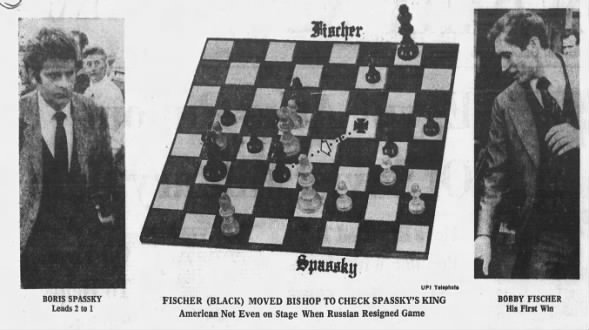
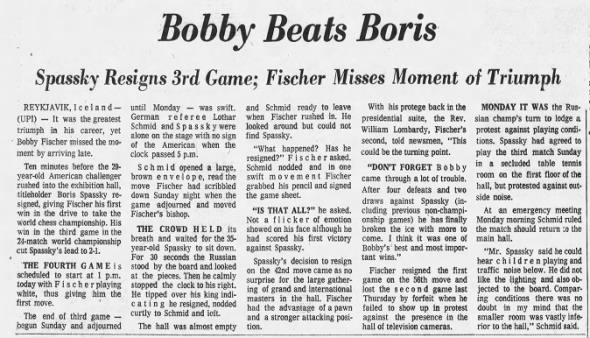 Bobby Beats Boris 18 Jul 1972, Tue Dayton Daily News (Dayton, Ohio) Newspapers.com
Bobby Beats Boris 18 Jul 1972, Tue Dayton Daily News (Dayton, Ohio) Newspapers.com
The Courier-Journal Louisville, Kentucky Tuesday, July 18, 1972 - Page 7
The Happy Look of a Winner
Wearing a victory smile, Bobby Fischer leaves Exhibition Hall in Reykjavik, Iceland, after defeating Boris Spassky in the third game of the world chess championship. Man at right is unidentified.
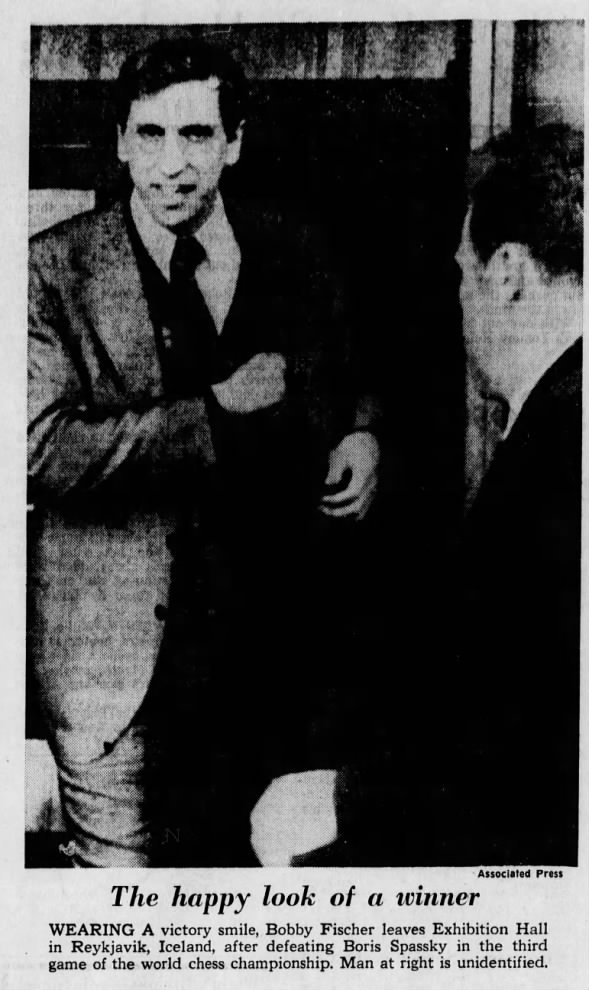 The Happy Look of a Winner 18 Jul 1972, Tue The Courier-Journal (Louisville, Kentucky) Newspapers.com
The Happy Look of a Winner 18 Jul 1972, Tue The Courier-Journal (Louisville, Kentucky) Newspapers.com
Statesman Journal Salem, Oregon Tuesday, July 18, 1972 - Page 18
Soviet Media Labels Fischer As Dangerous
Moscow (AP) The Soviet news media reported Bobby Fischer's third game chess victory over the Soviet champion Boris Spassky Monday night and one expert said it shows the American “is a very dangerous opponent.”
Reporting for Moscow television, international grandmaster Alexander A. Kotov said Fischer “conducted a very strong game” and used “dangerous and interesting novelties he prepared in advance.” But lest Russian fans get down in the mouth about Fischer's first victory over the Soviet champion, Kotov said: “It is necessary to say that in the remaining 21 games there will be victories and defeats for both of them. But we completely believe in and hope for the victory of Boris Spassky, an excellent strategist and good tactician.”
The State Columbia, South Carolina Tuesday, July 18, 1972 - Page 2
Russian Paper Conceded Before Game Resumed
Moscow (UPI)—The chess commentator for the government newspaper Izvestia conceded victory Monday to American challenger Bobby Fischer in the third game of his world title match with Boris Spassky even before the two men sat down to resume their adjourned game.
“As a result of Spassky's very lethargic playing, Fischer is now in the winning position and, although the game was adjourned, Fischer's victory is beyond doubt,” said Grandmaster D. Bronstein in Izvestia.
Bronstein said Spassky had made a fatal mistake on the 11th move of the game by trying to maneuver a knight around the edge of the board in a “surprise attack.”
“But much to Spassky's sorrow, it turned out that Fischer, who is known as the biggest buyer of all chess literature, not only knew this move but was prepared for it,” Bronstein said.
Journal and Courier Lafayette, Indiana Tuesday, July 18, 1972 - Page 18
Two Inferior Moves Cost Spassky Game by Isaac Kashdan
Los Angeles (AP)—When world champion Boris Spassky appeared in the playing room for the resumption of the adjourned third chess game with Bobby Fischer, it was to face the inevitable.
For the first time in their careers, Spassky was to surrender to Fischer. Spassky watched referee Lothar Schmid open the envelope and reveal the move B-Q6ch, which Fischer had made the night before.
Spassky and his second, Eufim Geller, had examined all the possibilities in the position. So had all the other grandmasters in Reykjavik. They had all come to the same conclusion. The game was hopeless.
Fischer's check forced Spassky's king to move to a black square, and none were helpful. If Spassky tried 42. K-K3, Fischer would reply Q-Q8.
This attacks the white bishop and also threatens mate in several moves. The bishop must fall as the minimum loss.
Spassky's best alternative would be 42. K-K1, when Fischer would win a second pawn by Q-Pch. Fischer would then have two connected passed pawns ready to advance. He could win with that advantage even if the queen were exchanged.
This was the kind of game that had been expected of Fischer after his extraordinary successes of the last two years.
The opening was quiet but with latent power on both sides.
Fischer aimed to set up an unbalanced pawn formation. He advanced tentatively on both the king and queen sides, feeling out his opponent.
Spassky, who seemed to lack any aggressive ideas, soon found himself on the defensive. Two or three of his moves were slightly inferior and that is all Fischer needed.
As soon as a single weakness was fixed which turned out to be Spassky's king pawn, Fischer concentrated his attack on that point.
He won the pawn and the game, with little further efforts.
The State Columbia, South Carolina Tuesday, July 18, 1972 - Page 2
Spassky Concedes On 42nd Move
Reykjavik, Iceland (UPI) — American challenger Bobby Fischer defeated Boris Spassky in the third game of their $250,000 world championship chess match Monday and cut the Russian champion's lead to one point.
Fischer's win, his first ever over Spassky, came when the Russian concede the game on the 42nd move, his position hopeless.
Spassky won the first two games, with Fischer conceding the first after 56 moves and forfeiting the second by refusing to show up in a protest against ([disruptive men operating]) television cameras in the hall.
The fourth game of the match is scheduled for 5 p.m. (1 p.m. EDT) Tuesday with Fischer playing the white pieces and making the first move.
The American was not even in the auditorium when the third game ended. Judge Lothar Schmid of West Germany opened a sealed brown envelope with a move Fischer had written down Sunday night when the game was adjourned, then moved Fischer's bishop to queen six to check Spassky's king.
The Russian took one quick look at the board, then stopped his game clock, signaling that he had given up.
Fischer rushed into the hall 10 minutes later and asked Schmid, “What happened. Has he resigned,” Schmid said Spassky had indeed given up, and Fischer rushed out again to the applause of what was left of the audience in the 3,000-seat hall.
Chess experts predicted Sunday Fischer would win the third game when he took command on the 38th and 39th moves and forced two queen checks in the fifth hour of play in a small backstage room in the same room as the auditorium.
Sunday's session was held in the small room after Fischer threatened to boycott the match because of ([disruptive crews of men operating the]) television cameras in the main hall. A small automatic ([closed-circuit]) camera was installed in the backstage room, but Fischer played anyway. ([Of course Fischer did, because that's the kind of camera equipment he was misled to believe, would be used in the auditorium, as well. Stationary and automatic that didn't make any noise, nor require disruptive three-men crews to operate them.])
The conclusion of the game Monday was played in the main hall when Schmid upheld a protest by Spassky that playing conditions in the backstage room were sub-standard.. There had been speculation Fischer would again balk at playing in the hall, but the Rev. William Lombardy, the 29-year-old challenger's second, said he would show up.
“Why shouldn't he” Lombardy said before the game started. “Bobby is going to win this game.”
Lombardy said Fischer did not object to the cameras themselves, but only to their noisy operating. Earlier, Fischer had referred to the cameras as, “the evil eyes,” and refused to play with them near the stage.
The Icelandic organizers of the match said they broke a $125,000 contract with Chester Fox, Inc., of New York by holding Sunday's session in the backstage room and could be sued.
&lduqo;We hope to get together with Mr. Fox and thrash this out,” said Hilmar Viggoson of the Icelandic Chess Federation. “We had to break the contract to save the match. Perhaps we can install cameras with extra long lenses out of Fischer's sight.” ([So it's admitted here, the cameras were never actually “hidden” and only now contemplating installation of cameras “out of Fischer's sight.”])
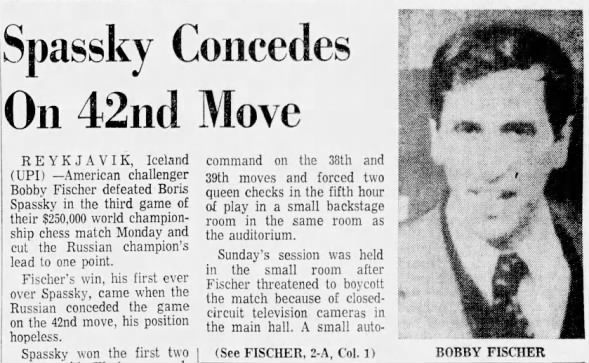 Spassky Concedes On 42nd Move 18 Jul 1972, Tue The State (Columbia, South Carolina) Newspapers.com
Spassky Concedes On 42nd Move 18 Jul 1972, Tue The State (Columbia, South Carolina) Newspapers.com
Journal and Courier Lafayette, Indiana Tuesday, July 18, 1972 - Page 18
Fourth Chess Championship Game Due--Without Turmoil
Reykjavik, Iceland (AP) — Bobby Fischer was back in the running for the world chess championship today, and it appeared that the fourth game might start this afternoon without the turmoil that has kept the match on the world's front pages for nearly two weeks.
The 29-year-old American chess whiz won his first game ever from world titleholder Boris Spassky on Monday and now trails the Russian 2-1 in their 24-game match. In seven previous meetings, Fischer lost five times and two were draws.
Spassky was at the chess board alone Monday when the third game resumed after the overnight adjournment, and referee Lothar Schmid opened Fischer's sealed 41st move, left with him the night before. It was bishop to queen six, and it put the champion's king in check.
Spassky sat for five minutes, turned his king on its side to concede defeat, and left the stage as the audience sat silent. A few minutes later, Fischer arrived. He stayed only two minutes.
The fourth game was scheduled to start at noon EST today, with Fischer having the first move because he is playing the white pieces.
Fischer lost the first game of the match last week ([due to disruptions coming from the three-men camera crews in the auditorium]), and the second was awarded to Spassky by forfeit when the American refused to play because of the presence of three movie cameras in the hall ([operated by disruptive men operating the cameras.])
The first part of the third game was played Sunday at Fischer's insistence in a private room ([other sources claim the organizers suggested it, as they knew Paul Marshall was about to press the matter in court, and yet the organizers stubbornly refused to obey the rules and remove the cameras from distracting Fischer after he demanded it done, as per the original rules as agreed with Col. Ed Edmundson of the US Chess Federation, for which rules, they, the Icelandic and Soviet organizers, had no respect]), with the audience watching on closed circuit television. The game was moved back to the main hall of the sports palace Monday when Spassky said he would not play in the private room, and Fischer made no objection.
Fischer must score 12½ points to win the title, while Spassky only needs 12 to retain it. A win in a game counts a point and a half a point.
The Orlando Sentinel Orlando, Florida Tuesday, July 18, 1972 - Page 2
World Chess Champion: Game 3
Arrow Shows Fischer's Winning Move … Game took 41 moves first day, 1 more second.
Belvidere Daily Republican Belvidere, Illinois Tuesday, July 18, 1972 - Page 4
Bobby Fischer, Here We Come by David Englund
The Fischer-Spassky chess match (or is it a non-match?) inspired me to play in the Rockford Forest City Open, an annual chess tournament rated by the United States Chess Federation (USCF).
This year's tournament attracted 93 players, an increase of about 20 over last year's total. Tournament director Al Kemp speculated that at least part of the increase could be attributed to interest spawned (pun intended) by the world championship match.
As one might expect, much of the between-rounds conversation centered around Bobby Fischer and whether he would win, lose, or walk out on Spassky.
The tournament was held at the Faust Hotel, and there happened to be a television set in a nearby room. So while the Fischer-Spassky game was being analyzed on Wide World of Sports, many of the players would make a move and hasten to the television room to see what and how Bobby was doing — sort of a busman's holiday.
Fischer was definitely the favorite of the group. One player went so far as to display a “Bobby Fischer for President” button on his lapel. Director Al Kemp was not so enthralled, but to him there was no question: “If Fischer decides to play, Spassky might as well put the pieces back in the box and go home.”
My results in the tourney were quite good (for me). I finished 3-2 in the five-round competition, which gave me a tie for the $25 prize for class D-E. Now, D-E does not stand for Dave Englund, as some skeptics might support; it is a low category in which I found myself after a disastrous first tournament in Chicago.
In the first round, I found myself pitted against an expert, which is one class below a master, and although I wasn't exactly demolished, it was hardly a contest.
My second game was probably the shortest of the tournament — five minutes. My opponent saw he was going to lose a piece (a piece is a queen, rook, knight, or bishop, as distinguished from a pawn) and conceded after only seven moves.
The third round of the day was a very exhausting affair, which I managed to win in 71 moves. My opponent was rated 1718, as opposed to my meager 1391, so I was extremely relieved when he resigned. Please do not ask me to explain the rating system, which is totally beyond comprehension. Personally, I believe it was devised by Transylvanian elves.
I also managed to win the fourth match, this time against an 1809-rated player. I had to defend several very nasty threats, but, fortunately, I was able to provide my adversary with some nastier ones.
The last game was, alas, mayhem, although I did manage to hold out some chances for a draw until the 71st move.
It is amazing how much courtesy was shown, even among the less skillful players. There is no talking during the game, except perhaps to say “check”.
Believe it or not, chess in an exhausting game. Several of Fischer's opponents have had matches postponed because of illness, and, after three rounds Saturday and two Sunday, I can understand why. The psychological pressures are sometimes incredible.
The tournament attracted players of all ages. The youngest was 14. The winner, with a 5-0 record was Steven Tennant of Palos Heights. He is way out of my league.
But that isn't so bad. Actually, my only regret is that Jan wasn't there to pelt my opponents with some of the chess pieces. That would have helped.
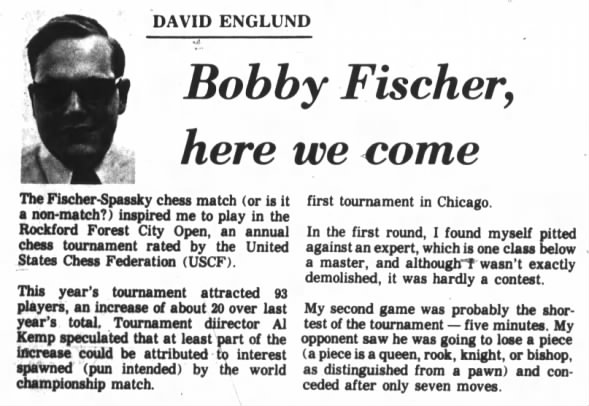 Bobby Fischer, Here We Come 18 Jul 1972, Tue Belvidere Daily Republican (Belvidere, Illinois) Newspapers.com
Bobby Fischer, Here We Come 18 Jul 1972, Tue Belvidere Daily Republican (Belvidere, Illinois) Newspapers.com
The San Francisco Examiner San Francisco, California Tuesday, July 18, 1972 - Page 8
Fischer, Spassky in a Draw
Reykjavik, Iceland — (UPI) — Play in the fourth game for the $250,000 world championship of chess got off to a brisk start today after it appeared for a few minutes that challenger Bobby Fischer might walk out once again.
But the cause of Fischer's discontent — ([NOT CLOSED-CIRCUIT CAMERAS, rather large, bulky television cameras accompanied by disruptive men hired to operate them. “Closed-circuit” cameras are small, silent, stationary and automatic. Why the blatant attempts to mislead the news public? But that's the Soviet way to get Fischer begging for cameras not to record and broadcast Fischer's humiliating defeat of the Soviet Union, for all the world to see. Pure unbridled Soviet egotism. That's all its about. the human-operated]) television cameras — was removed. Only 15 minutes before the fourth game between titleholder Boris Spassky and Fischer was to begin, the firm holding the film rights to the match tried to reinstall the cameras. ([With the Soviets knowing full well the disruption would blow Fischer's concentration, again!])
Fischer protested; an urgent meeting of the chess organizers was held, and the firm of Charles Fox agreed not to install the cameras. ([Constant attempts of the Soviets to provoke Fischer before and during matches, aiming to blow his concentration. Anyone who wrongly believes Chester Fox was not working in concert with the Soviets needs to research the background of news journalist Walter Duranty and his menacing cover-ups for Stalin-era tyranny under the Soviet Union]).
Finally Spassky strode onto the stage, four minutes after referee Lothar Schmid of Germany started the clock for today's game. Fischer walked in six minutes later and a hush fell over the 2500 seat auditorium.
Fischer moved his king's pawn two squares. This is his favorite first move, an aggressive opening.
Spassky, however, chose an unusual response for him. He went into the Sicilian defense, possibly, experts said, to surprise Fischer.
Play was swift.
Spassky made his first eight moves in less than two minutes, having obviously prepared his defense well in advance.
Fischer, behind 2-1 in the 24-game match, was also prepared, for he played his first seven moves in less than three minutes.
Opening Attack
For his eighth move, however, Fischer took 10 minutes; the intellectual battle was on in earnest.
Fischer's opening attack is known as the Sozin.
“And he knows more about that than anyone else in the world,” said the Yugoslav chess commentator, Dmitri Bjelica.
Fischer was dressed in a gray suit and brown sweater and Spassky wore a three-piece suit and matching pink tie and pocket kerchief.
Close on the half-way mark of the day's 40-move play, Spassky, despite his turn with black, was in a strong position.
Said U.S. grandmaster Robert Byrne at the 18th move: “If Spassky wants to draw, he can do it by swapping queens.”
Observers believed Spassky was pondering whether to try for a win, or play a safer game for a draw. He took about 20 minutes to make the crucial 18th move.
He avoided the queen swap.
A Russian win seemed a strong possibility at the time, said Byrne.
Reykjavik, Iceland — (UPI) — Bobby Fischer and Boris Spassky today agreed on a draw in the fourth game of the world chess championship after the 46th move.
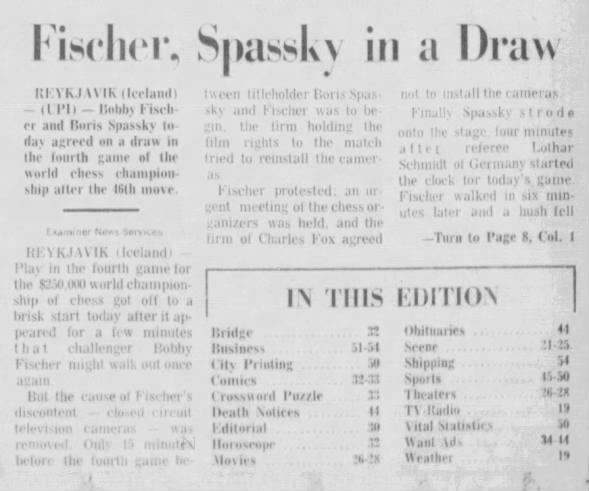 Fischer, Spassky in a Draw 18 Jul 1972, Tue The San Francisco Examiner (San Francisco, California) Newspapers.com
Fischer, Spassky in a Draw 18 Jul 1972, Tue The San Francisco Examiner (San Francisco, California) Newspapers.com
Tucson Daily Citizen Tucson, Arizona Tuesday, July 18, 1972 - Page 7
4th Chess Game Gets Under Way
Reykjavik, Iceland (UPI) — An adamant Bobby Fischer threatened another walkout today only minutes before the start of the fourth game of the $250,000 world championship chess match but agreed to play if ([crews of men operating large, bulky, human-operated]) television cameras were not used.
Only 15 minutes before referee Lothar Schmid started the clock for today's game the firm which bought film rights to the match tried to re-install the cameras.
“There will be no play if the cameras are brought in, that is sure,” one Fischer aide said.
An urgent meeting of the organizers was held and the firm, Chester Fox, agreed not to use the ([audibly, and visually disruptive crews of men operating bulky, television]) cameras.
Fischer then sat down in his special black leather and metal swivel chair and made his opening move — his usual king pawn.
Fischer boycotted the second game against world champion Boris Spassky of Russia because of Russia because of ([large, bulky filming equipment, carried by crews up to three men, which according to rules, Fischer was entitled to demand removal, according to Ed Edmondson of the U.S. Chess Federation who aided in drafting the original tournament negotiations in Amsterdam]) the cameras. Fischer said ([the disruptive camera crews of men, who Fischer reported as both visible, and audibly disruptive]) made him nervous.
Schmid awarded the game ([dismissing a valid protest submitted before the deadline, out of hand, and out of Pro-Soviet bias]) to Spassky and it gave Spassky a 2-0 edge. Fischer narrowed the margin to 2-1 with a win yesterday — his first ever against the Russian.
Fischer's first move was his favorite — an aggressive opening.
Spassky, however, chose an unusual response for him. He went into the Sicilian defense, possibly, experts said, to surprise Fischer.
Spassky made his first eight moves in less than two minutes, obviously having prepared his defense well in advance.
Fischer also was prepared, for he played his first seven moves in less than three minutes.
The Pittsburgh Press Pittsburgh, Pennsylvania Tuesday, July 18, 1972 - Page 28
One For Fischer
(UPI Telephoto) American chess challenger Bobby Fischer won his first game yesterday in the world championship match against Russian Boris Spassky. Fischer who had written out his first move after Sunday's adjournment, was not present as Spassky viewed the move, then conceded. Spassky leads the series two games to one. The next game starts this afternoon.
The Los Angeles Times Los Angeles, California Tuesday, July 18, 1972 - Page 1
Fischer Wins Third Game for His First Defeat of Spassky by Isaac Kashdan
Bobby Fischer defeated world chess champion Boris Spassky Monday in the third game of their $250,000 match in Reykjavik, Iceland, cutting the lead of the Russian champion to one point.
Fischer was not in the room at the moment of victory. Spassky arrived … according to 7/18/1972 AP report, “Finally, Spassky strode onto the stage four minutes after the start of the clock.” and referee Lothar Schmid opened the envelope which Fischer had entrusted to him when the first session of the game ended.
Spassky examined the move that Fischer had enclosed for his 41st turn. It was B-Q6ch. Spassky had evidently feared this reply. He gazed at the position on the board for several minutes, then stopped the clock in token of resignation.
Fischer turned up … closer to 10. Not longer after the late arrival of the Soviets.
According to news service reports, he was greeted by mixed cheers and boos from the audience, ([expected result of Soviet selecting the notoriously Racist, Anti-American Iceland as the venue host]), most of them already on the way out. Informed that he had won, Fischer promptly left the stage.
Series Dates Back to 1960
The victory was the first ever for Fischer over Spassky in a series that dates back to 1960. Spassky had previously won four times, including the first game of the current match, and drawn twice.
Spassky's lead was cut in half by the loss. It is 2-1, including the result of the forfeited second game. Spassky needs 10 points of the remaining 21 games to retain the championship. Fischer must score 11½ points for victory.
In the fourth game, scheduled to start at 10 a.m. PDT today, Fischer will have the white pieces and make the first move—for the first time in the match.
The players are due back in the main hall, instead of the small room offstage in which the third game was played. Spassky protested the use of the small room and said he would not play there again. Fischer had protested the cameras in the main hall.
Referee Schmid had set up the board for the adjourned position in the main hall, and this is where Spassky resigned.
The third game was an excellent example of Fischer's superior strategy. It was the kind he was expected to produce, based on his extraordinary successes of the past two years.
The opening was a quiet one, with little chance for fast combinations, but with latent power on both sides.
Fischer aimed to set up an unbalanced pawn formation. He advanced tentatively on both the king and queen sides, feeling out his opponent.
Spassky, who seemed to lack any aggressive ideas, soon found himself on the defensive. Two or three of his moves were slightly inferior, and that is all Fischer needed.
As soon as a single weakness was fixed, which turned out to be Spassky's king pawn, Fischer concentrated his attack on that point. When he won the pawn, final victory was hardly in doubt.
If Spassky had continued with 42. K-K3, Fischer would reply with Q-Q8. This attacks the white bishop and also threatens mate in several moves. The bishop would be the minimum loss.
The best alternative would be 42. K-K1, when Fischer would win a second pawn with QxPch. Fischer would then have two connected passed pawns ready to advance. At that stage he could win even if the queens were exchanged.
Daily News New York, New York Tuesday, July 18, 1972 - Page 56
HOOPla! Jo Jo White, sensational Celtic guard, calls his new three-year contract “surprising.” Surprisingly good or surprisingly bad? “If it was bad, do you think I'd have signed?” he asks…The only unsigned veteran Knick is Bill Bradley, vacationing in Greece. President Ned Irish says, “I expect him to play one more year.” …Like most of us, Dick Barnett has been an observer of the Bobby Fischer-Boris Spassky chess match. However, Barnett, an accomplished chess player, takes a sympathetic view of Fischer. “I just hope his attitude and behavior doesn't alienate too many people,” the Knick guard says. “I'd like to see him win, so that chess will get the recognition it deserves, not as an intellectual game, but because there's a lot in it for every day people. I hesitate to comment on Fischer's behavior without having been there, but people are making it an international crisis and it's not that comprehensive in scope.” ([Except to the Soviet Union.]) Barnett, incidentally, recently received his masters degree from NYU in Urban Public Policies and hopes to earn his doctorate next summer.
The Fresno Bee The Republican Fresno, California Tuesday, July 18, 1972 - Page 10
Soliloquy
“Fischer and Spassky, by holding out for a record $250,000…May go down in chess history…As the Cheque Mates!”
Fails to elaborate on the finicky, overbearing demands and complaints of European organizers who refused for months to sort out details before match. Belgrade's illegal demand of 35K USD “guarantee” refused by USCF! Icelandic “holding out” for 100% of gate profits. Australia's legal $225K bid snubbed by Russia, threatening they “would not play”. USSR selecting Anti-American, Racist Iceland who restricted entry of blacks and news coverage, in collaboration with Soviet goal to achieve blackout on media coverage. Schemes to disqualify Fischer and replace with Petrosian, et cetera…
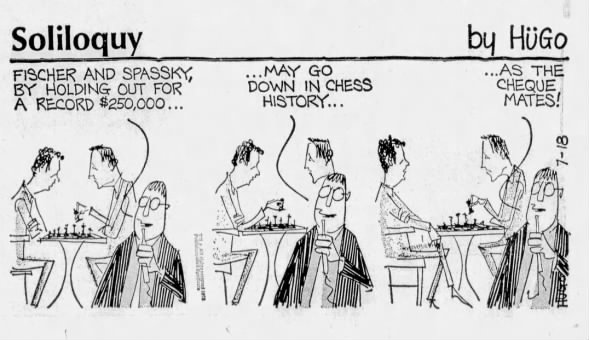 Soliloquy 18 Jul 1972, Tue The Fresno Bee (Fresno, California) Newspapers.com
Soliloquy 18 Jul 1972, Tue The Fresno Bee (Fresno, California) Newspapers.com
Aiken Standard Aiken, South Carolina Tuesday, July 18, 1972 - Page 6
Aiken Club on World Chess Championship by Dr. Lee Hyder
(Editor's note: The Fischer-Spassky World Chess Championship match has brought a renaissance to the ancient game. Yet, the various complications of such a match, the positions, the notation often escape the inexperienced player. The Aiken Chess Club has volunteered a series of articles to simplify the 24-game series. They will be written by Dr. Lee Hyder with collaboration of club members. Dr. Hyder, an SRP employee, is a former South Carolina state chess champion and ranks as an expert on the game.)
America's chess playing ace Bobby Fischer, has accomplished something Aiken area chess players had never imagined possible. He has made the game of tremendous interest throughout the community.
The interest is amazing. Now that play has begun people are following the game and asking about the positions or about the decisive moves in completed games.
The sudden public interest in chess may be a new phenomena in this century, but it is not unprecedented in South Carolina.
In the late 1850s the Charleston Courier carried a weekly chess column, as did many other newspapers around the South.
At that time an American, Paul Morphy of New Orleans, was recognized as the best player in the world and he seems to have aroused widespread interest in the chess. This all stopped with the War Between the States. The Courier published a chess column again in the 1890's but it was not widely read.
The popularity of the game has been increasing locally for some time.
More than 200 players now compete in tournaments in South Carolina. Five years ago there were no more than 50.
Children take to chess rapidly, especially teen-agers and a growing number of high schools have active chess clubs.
Aiken High and Ridge Spring Monetta High recently competed in the state high school championship along with 11 other schools.
This weekend the Carolina's Open, the most important tournament in the Carolina's, will be played in Beaufort. The organizers are planning for 50 or more entries.
As for the World Championship the third game which Fischer won was highly significant. Fischer in fact gave away the first two games, the first was a terrible blunder and the second a protest of the playing conditions.
But in the third game he showed that he could completely outplay Spassky. Spassky has not yet shown that he can get an advantage on Fischer through his own initiative.
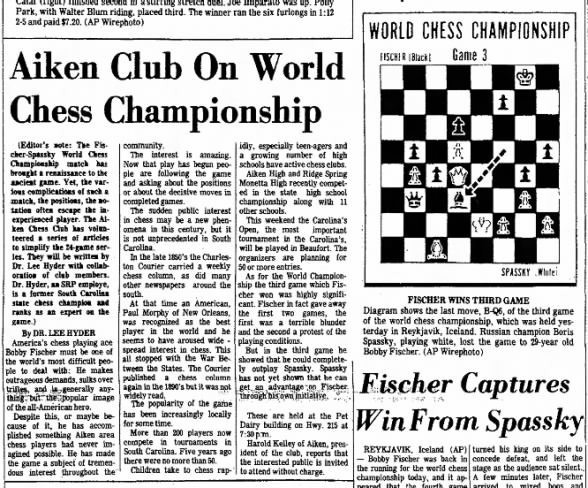 Aiken Club on World Chess Championship 18 Jul 1972, Tue Aiken Standard (Aiken, South Carolina) Newspapers.com
Aiken Club on World Chess Championship 18 Jul 1972, Tue Aiken Standard (Aiken, South Carolina) Newspapers.com
The Times San Mateo, California Tuesday, July 18, 1972 - Page 25
Chess Duels Flourish In San Mateo County by John Horgan
Their heads are bent low as they ponder their martial moves. They murmur to one another as the hints of tactics and grand strategy become apparent.
There is an aura of tension, a distinct feeling of combat, pervading this room.
The action unfolds on the array of tables spread across the enclosure.
Upwards of three dozen people are conducting their own private war games. But it is far from deadly. It is merely Thursday evening at the Burlingame-San Mateo Chess Club.
These folks wage war for fun.
And interest in this ancient game has never been greater here in this country and in San Mateo County.
All indications are that the four chess clubs here — Daly City, San Bruno, Redwood City and Burlingame-San Mateo — are reaping a direct harvest of new members due to the much-publicized championship match between Bobby Fischer and Boris Spassky in Iceland.
According to Wilfred Goodwin of Belmont, the director of the Burlingame-San Mateo club, his organization's membership has increased from 20 to almost 60 in less than four months. He expects to have 80 by this fall.
“This is unheard of,” he says. “People are coming from all over the West Bay Area to join the club now. We have members from San Jose, Pacifica and San Francisco. The interest in the game is surging.”
All told, Goodwin estimates there are about 200 club players in this county. The Burlingame-San Mateo club, which meets at 8 p.m. each Thursday night at the Burlingame Recreation Center, is the county's largest and most active.
Goodwin, 48 and an employee of a toy manufacturer in South San Francisco, has been a virtual one-man gang in the mid-county insofar as promoting chess in concerned.
“You might call the the Mr. Chess of the Peninsula,” Al Hansen, 47, of Hillsborough says. Hansen is a member of the Burlingame-San Mateo club. He has been playing club chess for four years and he has played the game informally for over 36 years.
For him, chess is a diversion which allows hi to overcome all kinds of social barriers.
“Beyond a doubt, chess is the social occupation which can cut through all barriers. Look at our players. Some are young, some are old. You might find a hippie playing with a doctor. Or a woman with an elderly man. In this game, you run the gamut.”
Good adds that a chess team from San Bruno once had a man without hands who used a pencil in his mouth to push his pieces around the board. On another occasion, Goodwin says his team played a school for the blind.
School-age children are becoming immersed in this pastime, too.
At Turnbull Middle School, San Mateo, 69 students turned out to learn chess last semester. The chagrined basketball coach there noted that he could barely find eight youngsters to make up a skeleton team in that sport.
At Fremont High School, Sunnyvale, chess is a block letter sport.
Another member of the Burlingame-San Mateo club, Herb Rosenbaum, 51, of San Carlos, says he is considering teaching the game at San Carlos High School.
“The challenge of this game is unprecedented,” Rosenbaum explains. “It surely beats tournament bridge. Luck is hardly a factor at all.”
Goodwin, who has been involved in organized chess in this area for more than a decade, says there is no question that the Fischer-Spassky match — has increased enthusiasm for the game here.
Hansen, a building developer, says it is somewhat ironic to see how Fischer is treated outside his own country by the chess-loving peoples of other nations. “In the U.S., Fischer had been a virtual unknown until this match. But outside America, he is regarded as an international figure of great importance. Joe Namath, on the other hand, is unknown outside this country.
According to Hansen, there are about 25,000 members of the U.S. Chess Federation, the official chess body in this nation, compared to several million in Russia and nearly 25,000 in Iceland.
Worldwide, he says there are 76 grand masters (the ultimate rating in chess) and 40 of them are Russians. America has ten.
But Fischer has succeeded in focusing the eyes of the U.S. on a game which is just now beginning to experience some growth in popularity.
“He has tremendous daring,” Rosenbaum says. “He is probably a full class ahead of everyone else.”
But the world of Fischer and Spassky is hardly that of the typical chess buff.
For most men and women (and there are far fewer women who play the game than men for some reason), chess is merely a diversion, not an all-consuming passion.
“The chess board is a microcosm of life,” Hansen says. “A person playing chess will reveal a lot about himself during the course of a game. It can be an addiction, a little like golf. But chess is a game you can take to bed with you at night through books.”
Goodwin, sensing that the timing in right to plug chess, has offered new members a bargain rate of $2 for entry into the club. The figure is usually $4.
The club provides everything: Boards, chessmen, clocks, coffee, tea, the works.
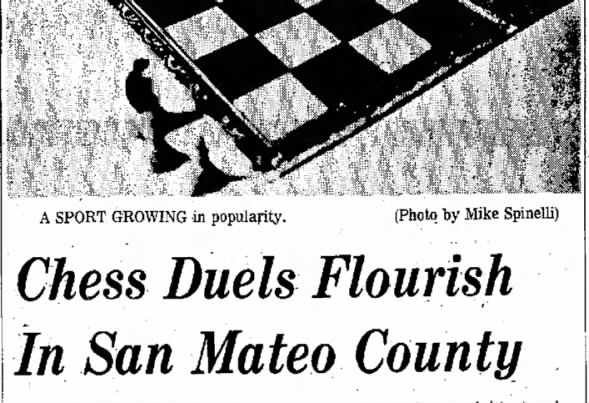 Chess Duels Flourish In San Mateo County 18 Jul 1972, Tue The Times (San Mateo, California) Newspapers.com
Chess Duels Flourish In San Mateo County 18 Jul 1972, Tue The Times (San Mateo, California) Newspapers.com
Grand Prairie Daily News Grand Prairie, Texas Tuesday, July 18, 1972 - Page 1
Fischer-Spassky: Chess Club Follows Title Game
Chess - a game somewhat regarded for the aloof and intellectual - may be taking on a new image in the United States.
That is due to the fact an American, Bobby Fischer, is challenging world title holder Boris Spassky in Iceland. The United States has never before had a world champion in chess.
However, the game has already attracted quite a following in the Grand Prairie area before the Fischer-Spassky duel made headlines.
During the last school term there were more than 50 members of a chess club at South Grand Prairie High School and Jackson Junior High and another club at Adams Junior High.
A few of the club members are following the game during the summer.
Herbert Summers is sponsor of the club and while he readily admits he's no master on the chessboard, he has made himself knowledgeable of the game and its players since he took over.
“When they (the students) asked me to be sponsor, I hadn't played any chess in quite awhile, so I decided to update myself,” he said.
A history teacher at South Grand Prairie High, he believes interest will pick up in the game if Fischer goes on to defeat Spassky in the showdown.
“There has been a steady growth of chess in this country,” he said.
He already had some interest stimulated in the games at South Grand Prairie. Between meetings for club business and friendly games, the teams participated in tournaments.
“I think my students learned more about the game from participating in tournaments than playing informally,” he said.
“We played Adams Junior High twice — and they beat us twice,&rduqo; he said wryly.
Chess competition can be mentally exhaustive. Grandmasters follow the adage of a healthy body produces a healthy mind and exercise daily.
“I know it produces quite a headache when you sit down to play someone equal to you just in an informal game, so I can imagine the strain on the masters.”
Commenting on Fischer, Summers said, “I guess he's what you call ‘good copy’ in the newspaper business.
“So I guess Fischer is not quite that eccentric. But the man is genius, no doubt about it. He remembers every move of every tournament he's played in.
“I've read a few of his games, but I don't pretend to understand Fischer. He's on a much higher plane than we are,” Summers said.
“As far as the benefits of chess, if mental exercise is good for you then so is chess,” he noted.
Several of the students are replaying the matches in Iceland by reading area metropolitan newspaper accounts which give each move in chess writing so it can be interpreted into a replay.
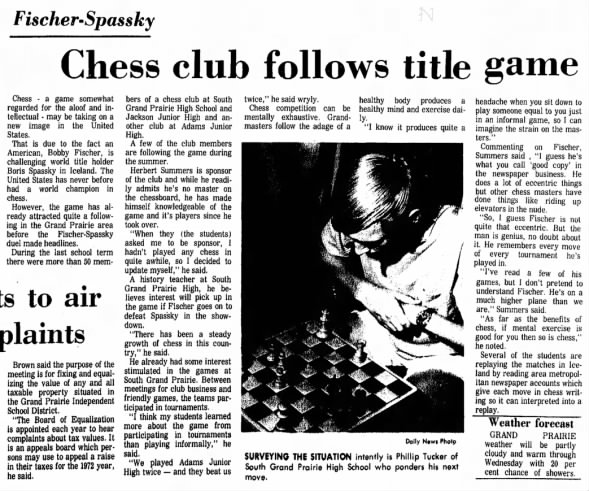 Fischer-Spassky: Chess Club Follows Title Game 18 Jul 1972, Tue Grand Prairie Daily News (Grand Prairie, Texas) Newspapers.com
Fischer-Spassky: Chess Club Follows Title Game 18 Jul 1972, Tue Grand Prairie Daily News (Grand Prairie, Texas) Newspapers.com
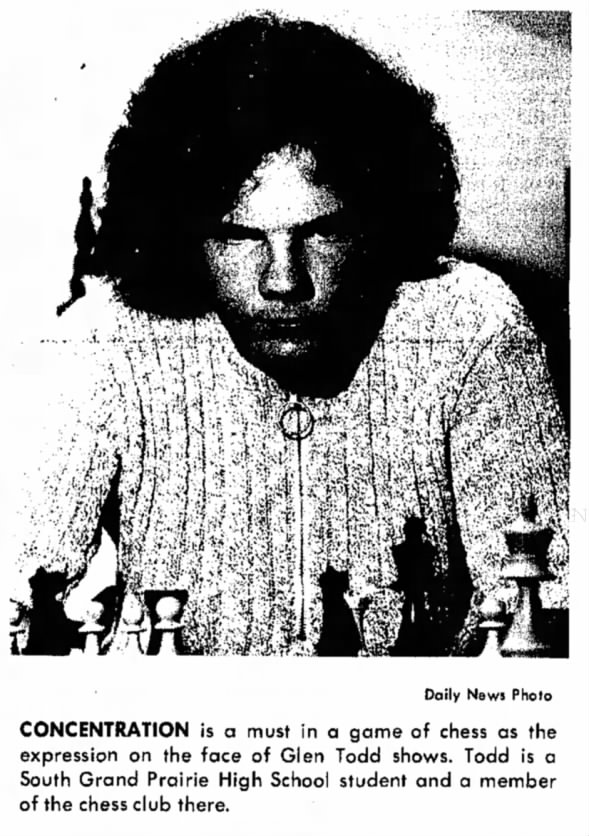 Concentration 18 Jul 1972, Tue Grand Prairie Daily News (Grand Prairie, Texas) Newspapers.com
Concentration 18 Jul 1972, Tue Grand Prairie Daily News (Grand Prairie, Texas) Newspapers.com
The Vancouver Sun Vancouver, British Columbia, Canada Tuesday, July 18, 1972 - Page 1
Fischer Win Apparent In Film Fight: Cameras Removed as Chess Resumes
Reykjavik (UPI) — Bobby Fischer, playing white for the first time, went after his second victory in his world championship chess match with Boris Spassky today after apparently winning his fight to have ([disruptive crews of men operating large, bulky]) television cameras removed from the hall.
Fischer used the opening he traditionally employs whenever he has the first move of a game, advancing his king pawn two squares. Spassky, who has a 2-1 lead in match games, responded by setting off what is known as the Sicilian defence.
The players met in the 3,000-seat Reykjavik auditorium, from which the ([human operated]) television cameras ([crews numbering up to three men]) have been removed at Fischer's insistence.
Fischer did not appear for and thus forfeited the second game of the 24-game, $250,000 world championship series last Thursday because of the television cameras in the hall ([which the rules implicitly stated Fischer had every right to do so since the men hired to operate the cameras were creating excessive distractions during game play in the first match]). That was the only previous game in this match in which Fischer had the white pieces, which move first.
Only 15 minutes before referee Lothar Schmid started today's game Chester Fox of New York ([loyal Soviet liaison]), who has the film rights here, tried to reinstall ([crews of disruptive men operating]) the cameras. Fischer refused to play if the cameras ([and distractive men operating them]) were allowed in the hall however, and Fox agreed to remove them. ([It would take more than “15 minutes” to reinstall and remove “close-circuit” television, but human-operated camera crew men are what they're actually talking about, but purposely written in such a way as to mislead readers to believe these were silent, automated “close-circuit” cameras, when they were not!])
“There will be no play if the cameras ([and crews of human operators]) are brought in, that is sure,” one Fischer aide told the Icelandic Chess Federation organizers of the match.
When he arrived Fischer immediately went to the board, looked at it briefly, and moved. His opening was hardly a surprise. In thousands of games Fischer has only varied from the king pawn opening a half dozen times or so.
Once asked why he always used the king pawn opening, Fischer said, “because it's the best move.”
After the seventh move, the huge “silence” signs began flashing off and on in the hall to quiet a buzz of excitement created by Spassky's seventh move, bishop to king two. The Soviet champion left the stage after making it.
Fischer studied the board for seven minutes before moving his one bishop to king three and leaning back in his special leather swivel chair. Spassky walked back on stage almost immediately and made his next move.
The two played quickly, Fischer completing his first 10 moves in 16 minutes. Spassky took only three minutes to complete his first 10 moves.
Spassky, apparently calm despite his first loss at a chess table in 12 years and his first ever to Fischer Monday, walked off and on the playing stage frequently.
The demand for silence in the hall was so urgent that at one point, while Fischer was studying a move, organizers sent young boys with oil cans to lubricate the doors leading into the hall to stop them from squeaking.
Spassky rarely employs a Sicilian Defence, and international chess experts said his play was extremely fast even by grand master standards.
With one point awarded for each victory and a half point for a draw, Spassky needs 12 points to defeat Fischer and retain his championship in this match. As the challenger, Fischer needs 12½ points to win the match.
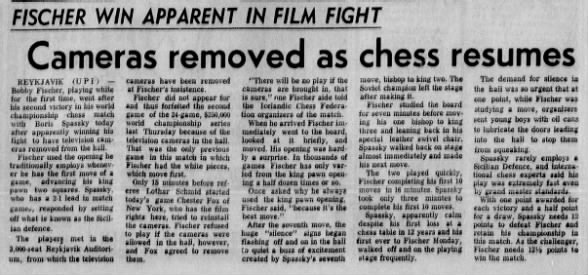 Cameras Removed as Chess Resumes: Cameras Removed as Chess Resumes 18 Jul 1972, Tue The Vancouver Sun (Vancouver, British Columbia, Canada) Newspapers.com
Cameras Removed as Chess Resumes: Cameras Removed as Chess Resumes 18 Jul 1972, Tue The Vancouver Sun (Vancouver, British Columbia, Canada) Newspapers.com
The Sedalia Democrat Sedalia, Missouri Tuesday, July 18, 1972 - Page 6
World Chess Title Rides With Fischer
For the past several days the dateline of Reykjavik, Iceland, has been eclipsed by Miami Beach. But now that the Democratic National Convention has departed from center stage, we can turn our attention to the battle for the international chess title.
It is a welcome change. Instead of the crowds, clamor, power plays and intrigues of Miami Beach, we have two men bent over a chess board in Iceland, settling between them the future of the world championship of chess.
Here matters of great moment will be decided not by cajoling and maneuvering, but by raw brainpower. Chance will have been reduced to an almost negligible factor. The purity of it all is irresistible.
Still, even the world chess title match has had its cliff-hangers. ([The Soviet sympathizers in Western Press have written and publicly criticized Fischer with demeaning mischaracterization and character assassination, outright distortions portraying Fischer as a Soviet caricature of a capitalist, refusing to play until the pot is sweetened, but the press failing to notify the public boldly, that Australia alone bid a whopping $225,000 which the Soviet shamelessly, snubbed in an all out conniption fit. Threatening to forbid Spassky to play! Their demand resulted in a reduction of the prize by $100,000. The real “money-grubber” is duly noted!])
But if we remember how Russia pampers and subsidizes its chess masters like so many nuclear physicists, perhaps we shouldn't begrudge Fischer too much his financial demands.
To the man on the street the chess games in Reykjavik perhaps seem remote and uninteresting. But to the Russians, who have held the title since 1948, it is a deadly serious business. Its loss would be the greatest blow to the prestige of the Soviet Union since American landed on the moon.
Bobby Fischer represents the best hope this country has ever had to pull it off. If he can keep his cool America may pull off a Cold War victory of the first order, and renew its faith in personal heroes in the process.
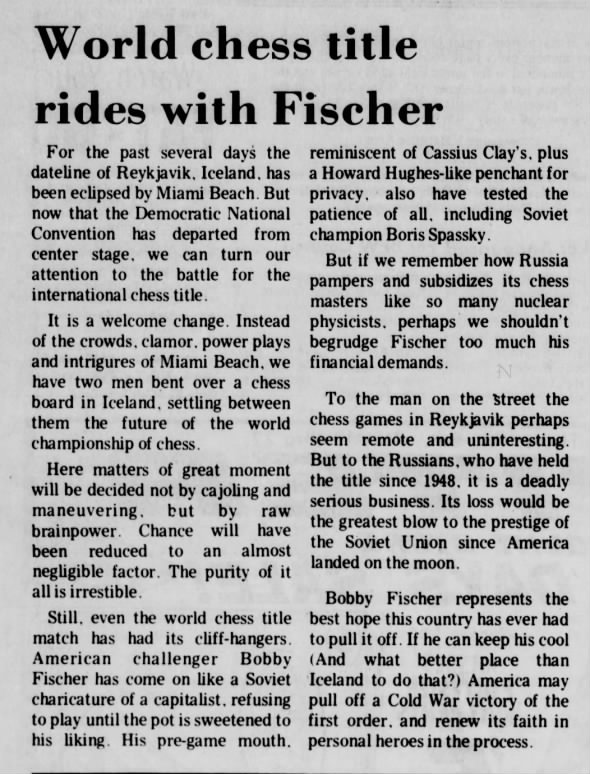 World Chess Title Rides With Fischer 18 Jul 1972, Tue The Sedalia Democrat (Sedalia, Missouri) Newspapers.com
World Chess Title Rides With Fischer 18 Jul 1972, Tue The Sedalia Democrat (Sedalia, Missouri) Newspapers.com
The Guardian London, Greater London, England Tuesday, July 18, 1972 - Page 4
A Novel Win for Fischer by Leonard Barden
Bobby Fischer won the third game of the world chess title match in Reykjavik when Boris Spassky resigned as soon as the referee opened the envelop containing Fischer's sealed last move at the end of Tuesday's session and played 41. … B-Q6ch. Fischer was not in the hall when Spassky resigned.
Whey did Spassky resign? After Fischer's check with the bishop, white checkmated no matter where he places his attacked king.
If 42. K-Q2 Q-B7ch, and if 43. K-K1 Q-K7 mate, or if 43. K-K3 QxB mate.
If 42. K-K1 QxP ch, 43. B-Q2 Q-N8 ch, 44. B-B1 QxB mate.
If 42. K-K3 Q-Q8. And now if 43. B-N2 Q-B6 ch, 44. K-Q2 Q-K7 ch, 45. K-B3 Q-B7 mate, or if here 43. Q-N2 P-B6, 44. QxP Q-K7 ch, 45. K-Q4 Q-K5 mate.
Bobby's victory, reducing his match deficit to 1-2 is not only a fine example of the very best side of his chess ability but also strikes a moral blow in the negotiating battle which will decide whether game four of the championship is played in the auditorium before thousands of eager spectators and the ([disruptive men operating]) cameras which Bobby ([rightfully dislikes and the rules permit him to legally demand removal thereof]) or in the upstairs “chess cupboard” where he scored his win.
Fischer had looked set for his first victory after 20 moves and his startling conception on his eleventh move made all the haggling seem worthwhile.
Fischer's imaginative 29th move in the first game will be much talked about by all future generations of chess players. In this game, he produced an exciting innovation the validity of which will be closely scrutinized in the next few months.
The Guardian London, Greater London, England Tuesday, July 18, 1972 - Page 4
Classic Move by American by Michael Lake, Reykjavik, July 17.
Bobby Fischer scored a convincing victory over Boris Spassky here tonight in the third game of the 24-game world chess championship. Since Fischer was already two games down — one lost ([due to disruptive camera crews placed there by the Icelandic/Soviet Chess organizers]) and one forfeited in a blaze of controversy ([over the disruptive camera crews placed there by the Icelandic/Soviet Chess organizers]) — and since he was playing disadvantageously with black, his victory is all the more impressive and promises to make the contest what it was always billed to be — the match of the century.
This is the first time Fischer has beaten Spassky and now he has broken his duck he can be expected to play with ever more aggression.
Fischer controlled the game from the beginning with a surprise move that had him always one jump ahead of Spassky. The referee, Herr Lothar Schmid, who is himself a grand master remarked privately that Fischer's game was a masterpiece.
Mr. Jack Collins, the disabled master said tonight the game reminded him of the great Capablanca at his classic best.
At last night's adjournment at the forty-first move and with black to move, Fischer put his move in a sealed envelope as is customary. At the appointed time today, the move was made for him ([by the arbiter, as is customary]).
Chess players who had spent half the night and most of the day calculating what this would be, decided that it was the end for the Soviet champion. So it was: without waiting for Fischer to arrive, Spassky resigned and left the building. Fischer turn up to find the hall emptying.
The game was resumed on the stage of the auditorium after Spassky had protested to the referee that Fischer's determination to play in a back room away from all television cameras ([operated by crews of men hired to disrupt play]) was no longer acceptable.
But the cameras of Mr. Chester Fox of New York ([but, like the Icelandic organizers, a very friendly ally of Soviet Russia]) who had the exclusive rights have now been removed altogether. Mr. Fox is without a job and is making no secret of his intention to seek redress through the courts. ([Then surely the Icelandic Chess Federation should repay every dime on a contract that everyone, worldwide in media outlets and Fischer himself agreed was unconstitutional and should've never been drawn up in the first place. Especially considering Fischer was never given a fully-disclosed description of the nature of the arrangements, to make a fully-informed consensual agreement. Fischer was being misled about what kind of cameras were to be used…up to the opening match, when he was given a tour of the auditorium, but the camera crews were absent. Fischer was Misled to believe the devices were to be automatic close-circuit cameras… not noisy crews of men, operating large, bulky cameras… now, the Soviets plan to vicariously sue Fischer in hope he permanently parts way from the chess world in future competitions]).
The Minneapolis Star Minneapolis, Minnesota Tuesday, July 18, 1972 - Page 23
Bobby and Boris 'Show' Booms Chess-Sets Sales by John Greenwald
Twin Cities retailers say chess sets usually sell best during Christmas, along with checkers, Monopoly, and other board games.
But the Bobby Fischer-Boris Spassky championship match seems to have caused an out-of-season run on chess sets in some stores.
“We're almost sold out of sets,” said Arvilla Ohlgren, stationery department buyer for Powers Department Store on Nicollet Mall.
Mrs. Ohlgren said the added sales probably are due to public interest in the 24-game Spassky-Fischer match being held in Reykjavik, Iceland.
One set the store has had some trouble moving is a collection of pieces assembled by hand from nuts and bolts. The pieces have a $36 price tag.
Mrs. Ohlgren said the maker, a Minneapolis woman, wanted $18 for the set.
“Since we're a retail operation we marked it up to twice that,” Mrs. Ohlgren said.
“The maker has different kinds of handmade sets at home, but so far we haven't been able to sell this one.”
She said the nuts-and-bolts collection went on display about a month ago, and is one of the few chess sets Powers has available.
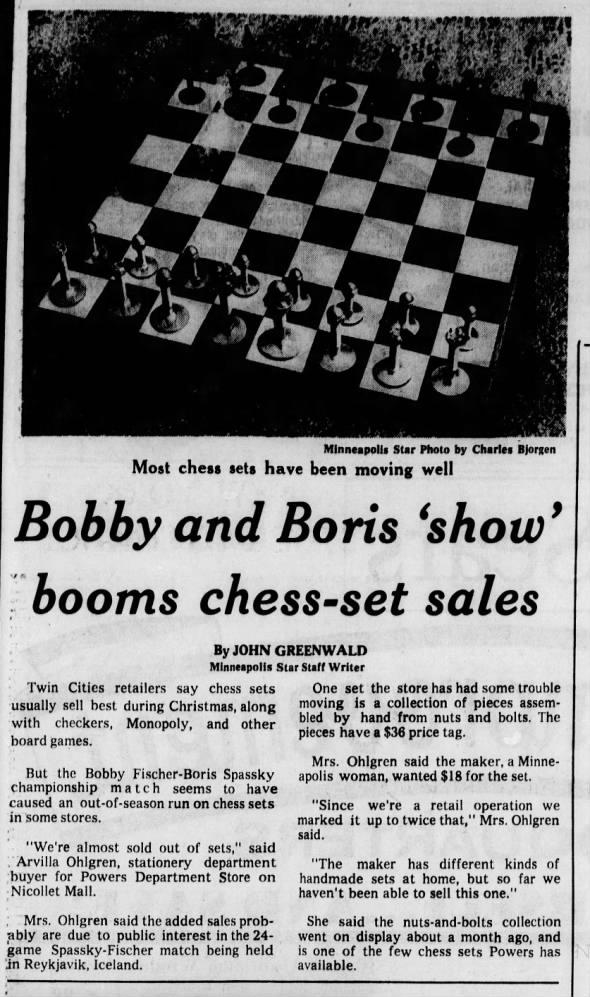 Bobby and Boris 'show' booms chess-sets sales 18 Jul 1972, Tue The Minneapolis Star (Minneapolis, Minnesota) Newspapers.com
Bobby and Boris 'show' booms chess-sets sales 18 Jul 1972, Tue The Minneapolis Star (Minneapolis, Minnesota) Newspapers.com
The South Bend Tribune South Bend, Indiana Tuesday, July 18, 1972 - Page 4
A Woman Gets Into Chess
I'm just getting into chess so I've really been following the match between Bobby Fischer and Boris Spassky. I've never seen in any of the news stories how these chess tournaments get started. Also, since I'm a female and an advocate of women's lib, why's it always the men?— M.S., Niles, Michigan
Chess is a game of antiquity. There's some evidence that it had a common origin with backgammon, parcheesi and even cribbage. Chess can definitely be tracked back to the Persians around 500. The name comes from the Persian word shah. Most of the terminology also is Persian including checkmate which comes from “shah mat” meaning the king is dead. The Arabs picked the game up from the Persians and carried it to Europe. There were many variations but international contests gradually brought about standard rules. The first world champion goes back to 1726 when Philidor of France claimed the title. World champions have been recognized officially since 1843. U.S. titles were started in 1857 when the first tournament was held in America. As for female chess players, they too have a tournament and right now Yelizaveta Bykova of Russia holds the title.
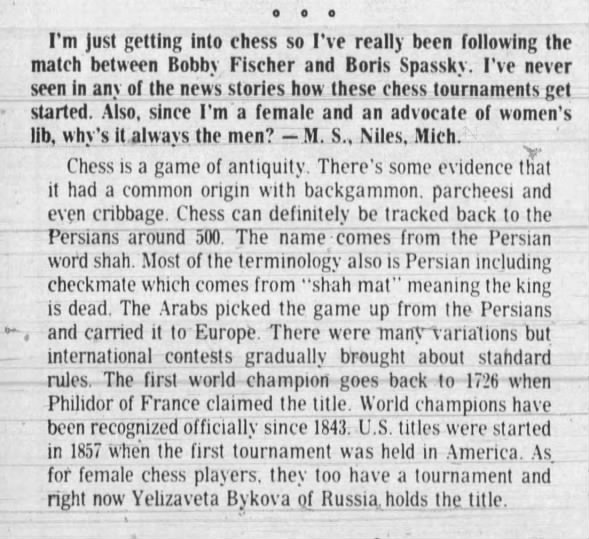 A Woman Gets Into Chess 18 Jul 1972, Tue The South Bend Tribune (South Bend, Indiana) Newspapers.com
A Woman Gets Into Chess 18 Jul 1972, Tue The South Bend Tribune (South Bend, Indiana) Newspapers.com
The Miami Herald Miami, Florida Tuesday, July 18, 1972 - Page 100
Chess Tests Brains and Patience by John Pennekamp
CHESS could well be the world's oldest “think” game.
It is not a game for impatient persons and, in its upper elevations, expert levels, not even for persons of average patience.
Much of the game, say the authorities, is “played off the board,” in an effort to upset your opponent's tranquility.
Which may account for some of the conduct you have been reading about in the contest between America's Bobby Fischer and the Soviet Union's Boris Spassky in Iceland.
([Examples: USSR selecting Anti-American, Racist Iceland who restricted entry of blacks and news coverage. Fails to elaborate on the finicky, overbearing demands and complaints of European organizers who refused for months to work out details pre-match. Belgrade's illegal demand of 35K USD "guarantee" refused by USCF! Australia's legal $225K bid snubbed by Russia, threatening they "would not play". Schemes to disqualify Fischer and replace with Petrosian, etc.
2nd Game Camera Boycott? “instead of..video tape film that didn't make any noise they had guys with film cameras that were..all around..making a racket..and visually you could see them moving around.”- R.J. Fischer, “Under agreed rules of the match, [Fischer] had the right to object and to demand removal of the cameras if they disturbed him.” -Edmondson, USCF])
CHESS, say the authorities, may claim to be both an art and a science.
It cultivates memory and reason.
Before it vaulted to the public attention which the Iceland series has given it, chess got most of its modern-day promotion from memory displays by some of its more ardent adherents.
They'd engage in a dozen or more games at the same time, often without even looking at the boards, which meant that at and from the beginning they'd have to remember the positions of 12 or more times 32 men or “pieces” (in tribute to the Lib movement it should be noted that not all the pieces are men. Each player has one queen.)
I TRIED to become a chess player once, but I'm afraid I belonged to the impatient class. It was much too slow. I shifted to checkers.
In addition to keeping in mind all of the injunctions about offense and defense, you had to remember the rules about the allowed movements of the pieces, their direction and how many spaces.
Then I was cautioned not to go figuring on my next move, but to first decide why my opponent made his most recent one. With it in mind I could proceed with considering my next move—according to Plan, of course.
Another injunction: “Your opponent will be watching your eyes to see on which part of the board your attention is concentrated; therefore don't show too much attention there.”
There was a lot of other cautions, such as to form a definite plan of attack and don't make the beginner's mistake of trying to capture your enemy's pieces.
I TRY to apply the rules and purposes to the upswing in sales of chess boards and pieces which are attributed to the Iceland match. There's no question that we are in for better memories and reason, as well as a calmer recreational trend.
And, if that doesn't happen (happen may be too fast a word to use in connection with chess; maybe eventuate would be better) then chess boards and pieces long have been decorations in living rooms and old fashioned parlors and libraries.
In fact, the carving of chess pieces from fine woods and ivory is a centuries old art, and these are displayed in many American homes.
There was a time when the loss of a chess match by an expert would be explained by commenting that he “fell in love” with one of the pieces — a tribute to the domination of art over strategy in his mental faculties.
APPARENTLY nobody knows how old the game is, nor has anybody followed precisely its changes. It is known that once it was played by four persons which may help to explain the seconds and such which now are part of the top-flight players' entourages.
First writings about chess are traced to the Arabs and Hebrews in Granada, about the 11th Century. But it was being widely played in Moslem nations long before that time, its historians contend.
Nor did it necessarily originate there; most believe that it started in China and migrated to India.
FROM India it is believed to have spread to Persia in about the 7th Century, which brings it back to the Arabs in the 14th Century. It presumably was adopted by the Arab conquerors of that country who brought it to Europe.
It helped brings that “checkmate” into the English language, if, in fact, it isn't responsible for it in the first place.
It is the exclamation of the winning player when he has placed his opponent's king into a position from which there is no escape.
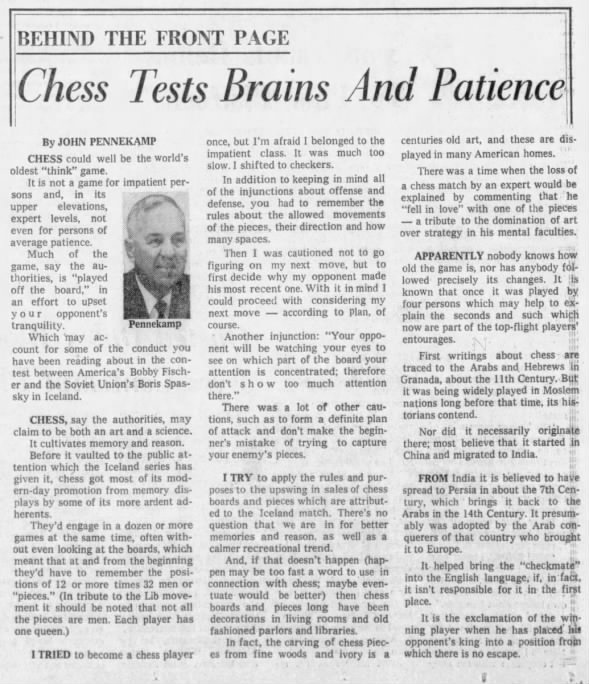 Chess Tests Brains and Patience 18 Jul 1972, Tue The Miami Herald (Miami, Florida) Newspapers.com
Chess Tests Brains and Patience 18 Jul 1972, Tue The Miami Herald (Miami, Florida) Newspapers.com
The Philadelphia Inquirer Philadelphia, Pennsylvania Tuesday, July 18, 1972 - Page 6
At Conventions, as in Chess...
Chess is traditionally a game of patience as well as endurance. Contestants match wits, eyeball-to-eyeball, not only for hours but for days. When playing time in a particularly close encounter reaches marathon proportions, participants usually recess, get a good night's sleep, and resume with clear heads the following day. Some old-timers say the best rule of thumb is to call it quits for the evening when there's no more beer in the refrigerator.
Showing commendable respect for the clock, challenger Bobby Fischer of the United States and champion Boris Spassky of the United States and champion Boris Spassky of the Soviet Union suspended play in the third game of their world title match in Iceland until the next afternoon after they had battled for five hours and 18 minutes, each man making 41 moves. Mr. Fischer's 41st move was sealed in an envelope and placed in the custody of the referee—avoiding any advantage that Mr. Spassky might have derived from a sleepless night pondering his counter move.
In political conventions, as in chess, it shouldn't be necessary to finish every piece of business on the same night it is begun. Maybe future convention planners, with last week's all-night ordeals at Miami Beach still painfully fresh in mind, can learn something from the tourney in Iceland.
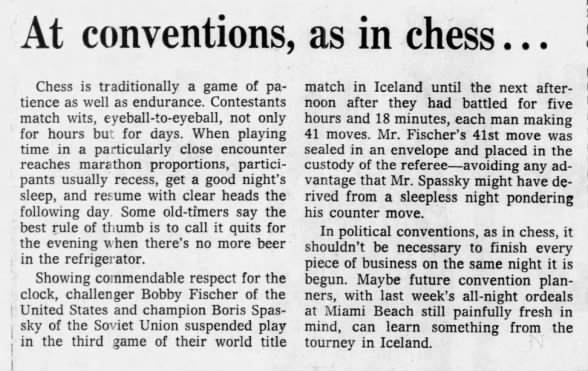 At Conventions, as in Chess... 18 Jul 1972, Tue The Philadelphia Inquirer (Philadelphia, Pennsylvania) Newspapers.com
At Conventions, as in Chess... 18 Jul 1972, Tue The Philadelphia Inquirer (Philadelphia, Pennsylvania) Newspapers.com
Simpson's Leader-Times Kittanning, Pennsylvania Tuesday, July 18, 1972 - Page 7
Capitalistic Chess
Unfamiliar with the profit motive, the Russians were aghast at Bobby Fischer's dilatory approach to his world championship chess tournament with the titleholder, Boris Spassky, at Reykjavik, Iceland.
Americans are much less concerned about the commercial aspects of Fischer's recent moves, accustomed as they are to that springtime phenomenon, the baseball holdout, and its most recent and broadest manifestation to date, the baseball strike.
Still, there has to be latent admiration — even in Russia — for a brash young capitalist who not only put chess on the front pages of the world but also succeeded in doubling the purse to $250,000 — for an intellectual exercise.
The sporting world may never be the same again.
Daily News New York, New York Tuesday, July 18, 1972 - Page 4
Boris Sees Bobby's Move and Gives Up by Robert Byrne
Reykjavik, Iceland, July 17—Boris Spassky resigned game three of the world chess championship match to Bobby Fischer tonight without further play. The Russian world champion's lead was reduced to 2-1.
Spassky's appearance for the second session of game three was a mere formality. After Chief Referee Lothar Schmid opened the envelope containing black's 41st move, read Fischer's boldly written notation, and played it on the chessboard, it took Spassky only a glance to decide that further resistance would be silly. He stopped his clock, and motioned to Schmid that he was giving up.
Minutes later, after Spassky had left the stage of the exhibition hall, Fischer came in, noticed that the champion's clock was not running, and asked: “What's the matter, he resign?” When Schmid informed him that this was indeed the case, Fischer signed the score sheet and left to the applause of the fans.
Yesterday's session was held in a private room at Fischer's request ([or, as some sources claim, at the insistence of organizers, who broke rules and were catering to the wily whims of the Soviet Federation and Chester Fox, Inc., of whom the rules state emphatically, if Fischer demanded the cameras and crews of disruptive men operating the cameras, removed, it should be made so. However, Fischer was forced instead, to play out game three in a dreary back room of the auditorium]), but he had changed his mind and consented to play tonight's adjournment before the fans on the stage. Fischer's victory was his first ever against Spassky, who had beaten him four times over the board, including the opener of this match ([much due to Soviet and Icelandic insistence the disruptive camera men be given top priority, to blow Fischer's concentration]). Game two, awarded to Spassky when Fischer failed to show up in protest against ([disruptive men, operators of]) television cameras, ([and that the so-called “committee” was made up of 3 pro-Soviet vs. 1 pro-Fischer advocate, unfairly deciding the 2nd game in favor of Soviets, when, after all, a valid petition was presented before the deadline, constituting a “hearing” that was neither fair, nor impartial]) makes five Spassky victories in all.
In the first session last night, Fischer fans saw him in scintillating form. Sharp, original opening play, featuring the radical knight play in Move 11, N-R4, enabled him to take the initiative away from Spassky, who was on the defensive the whole game. A feint for king's side attack at moves 14 and 15 forced the repair of his doubled pawns.
Then he regrouped for a queen's side pawn storm by Moves 19 to 21, which resulted in his obtaining a strong passed queen's bishop pawn.
The final attack was directed against the artificially isolated king's pawn which could not be supported by the white's bishop's pawn. After Fischer won by going for the white king, whose last defense was stripped by Bobby's lethal 41st move in the sealed envelope.
Game four is scheduled for tomorrow at 5 p.m.—1 p.m. New York time.
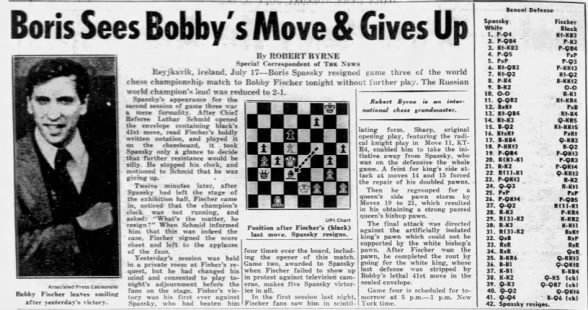 Boris Sees Bobby's Move and Gives Up 18 Jul 1972, Tue Daily News (New York, New York) Newspapers.com
Boris Sees Bobby's Move and Gives Up 18 Jul 1972, Tue Daily News (New York, New York) Newspapers.com
The Age Melbourne, Victoria, Australia Tuesday, July 18, 1972 - Page 10
Fischer Poised to Make it 2-1 by Michael Woodhams of the Melbourne Chess Club
Challenger Bobby Fischer put himself back in to the world championship match with Boris Spassky by establishing a commanding position at the adjournment of the third game.
The game featured the first of the innovations prepared by the players and their aides.
Fischer took the initiative by employing the Benoni defense.
Then, Fischer's surprise move, 11. … N-R4, gave the American initiative on the King side leading to the fall of Spassky's King pawn and, at the adjournment, the promise of victory.
Here are the moves in the first session of play.
1. d4 Nf6
2. c4 e6
3. Nf3 c5
4. d5 exd5
5. cxd5 d6
The Modern Benoni—Black's strategy is to attack the White pawn centre with — P-K3 and —P-QN4 opening the game up for his pieces.
6. Nc3 g6
7. Nd2 Nbd7
8. e4 Bg7
9. Be2 O-O
10. O-O Re8
11. Qc2 Nh5!
A new move in this position — Black offers Spassky the chance of isolating his K-side pawns, but at the cost of conceding the Bishop pair.
12. Bxh5 gxh5
13. Nc4 Ne5
14. Ne3
In view of what follows, it might have been better to exchange Knights immediately.
14. … Qh4!
15. Bd2 Ng4
16. Nxg4 hxg4
17. Bf4 Qf6
18. g3?
Permanently reducing his King side to passivity. It is invariably a bad move to weaken the King field without the presence of the white squared bishop.
18. … Bd7
19. a4 b6
20. Rfe1 a6
21. Re2 b5
22. Rae1 Qg6
23. b3 Re7
24. Qd3 Rb8
25. axb5 axb5
26. b4 c4
27. Qd2 Rbe8
28. Re3 h5
Having laid siege to Spassky's King Pawn, Fischer builds up his position before capturing his quarry.
29. R3e2 Kh7
30. Re3 Kg8
31. R3e2 Bxc3
32. Qxc3 Rxe4
33. Rxe4 Rxe4
34. Rxe4 Qxe4
35. Bh6 Qg6
36. Bc1 Qb1
37. Kf1 Bf5
38. Ke2 Qe4+
39. Qe3 Qc2+
40. Qd2 Qb3
41. Qd4 play adjourned. A pawn down, and with mating threats against his King, Spassky could well resign after seeing Fischer's sealed 41st move.
For example, 41. … B-Q6ch should win quickly. If 42. K-K3 Q-Q8; 43. B-N2 Q-B6ch; 44. K-Q2 Q-K7ch leads to mate.
Or, 43. Q-B3 Q-B6ch. with a similar end.
And if 42. K-K1 QxNPch wins a second pawn, or 42. K-Q2 Q-B7ch wins the Bishop.
41. … Bd3+ 0-1
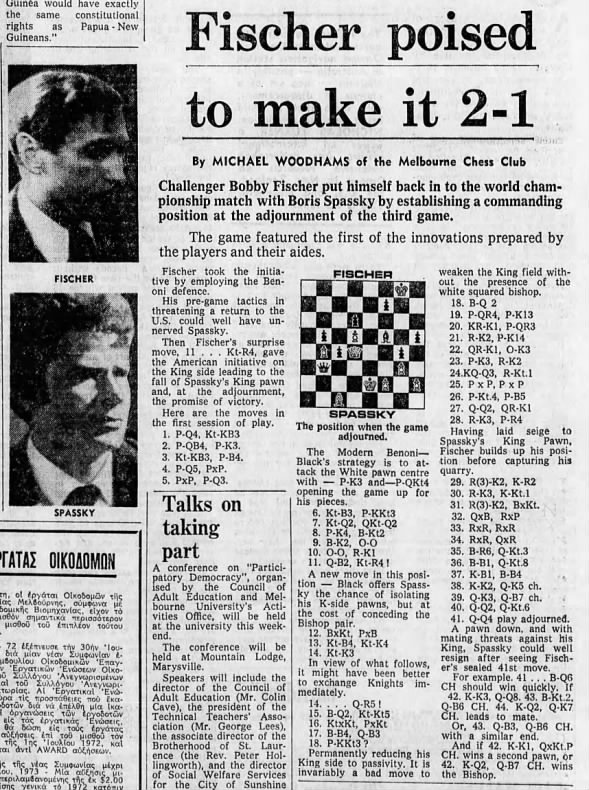 Fischer Poised to Make it 2-1 18 Jul 1972, Tue The Age (Melbourne, Victoria, Australia) Newspapers.com
Fischer Poised to Make it 2-1 18 Jul 1972, Tue The Age (Melbourne, Victoria, Australia) Newspapers.com















